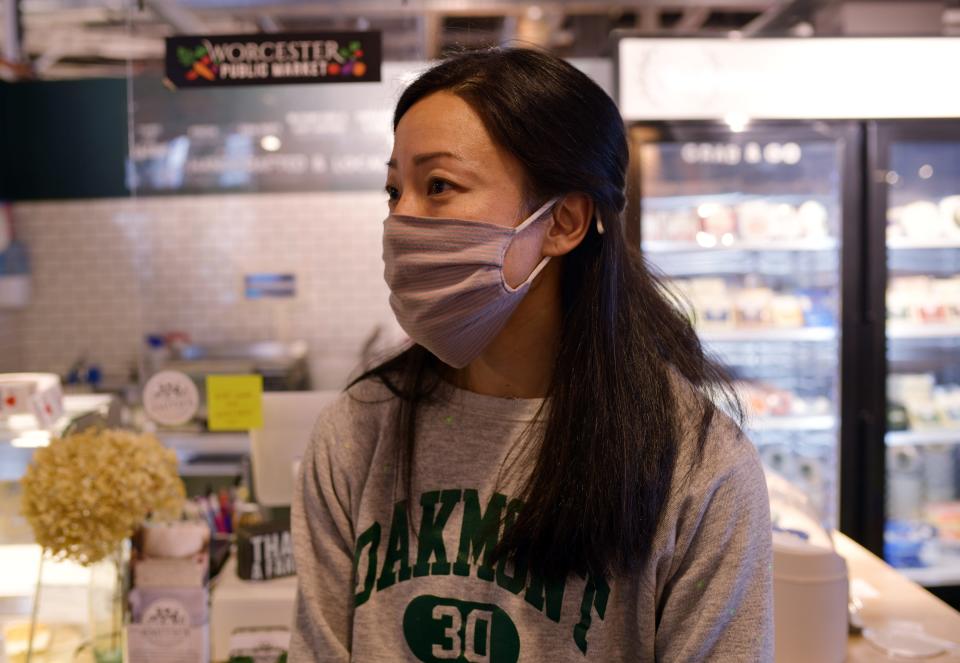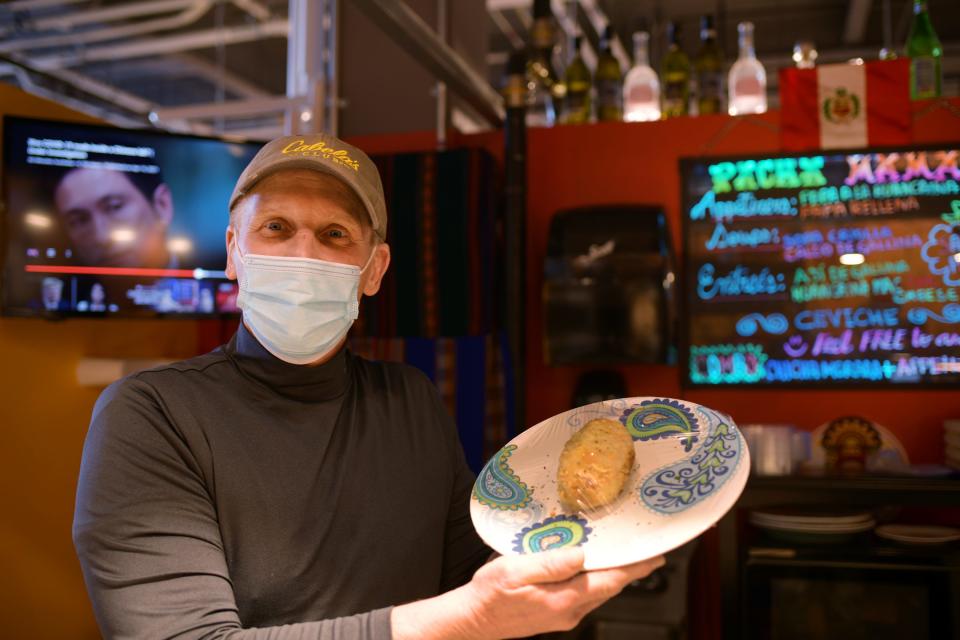Omicron surge reducing hours for Worcester businesses, requires flexibility with staff

WORCESTER — As the omicron surge has brought record COVID numbers, Central Massachusetts businesses and restaurants have had to adjust for workers who are out sick while vendors continue to be cautious and flexible.
As Colleen Nadeau of Creative Cakes by Colleen at the Worcester Public Market prepared to ice a cookie cake Thursday afternoon, she said that managing the recent surge has again emphasized the need to make customers feel safe and comfortable when they come over to her location.
Along with Nadeau's husband, five employees help operate Creative Cakes. Along with following city guidelines for masking, Nadeau said that flexibility is necessary when dealing with the possibility that an employee may be out. At the time one of her employees was out after their child had close contact with someone who tested positive.
"If you can't be flexible right now two years into this, that's probably gonna do you in," Nadeau said. "I think it's taught us all that flexibility is probably the most important trait that any of us can have over the past couple of years."

Possible exposure requires some adjustments
Leah Catlin, co-owner of Smith's Country Cheese, said they usually see customers who are masked and she has masks available for any who are not. Catlin and two other employees operate her business' booth at the Public Market in single shifts. One of the three experiencing a possible exposure would require some adjustments, Catlin said.
"We would just have to do some shifting around just to make sure that the shifts are covered while the market's open," Catlin said. "Because this is my family's business it would fall to me to make sure that the shifts are covered. But luckily we haven't had any exposure with our employees."
Vaccinations, masks important
Vishal Suchde and wife Pooja Vishal operate Namaste Woo at the Public Market. Suchde said it was important that the couple and their additional employee are vaccinated and wearing masks.

Suchde said that they are trying to encourage more online ordering and curbside delivery to make customers feel safe and keep their stand operational. Vishal said that the lockdown period was difficult for businesses and they are trying to avoid returning to that state.
"It was really tough for small businesses to survive in this world that we were living in," Vishal said.
If one of the three operating the booth had to quarantine, Suchde said it could seriously impact the business, but they have backup plans in case a quarantine is required.
Cleanliness most important aspect
Clifford Buck of Pacha Mama said cleanliness has been the most important aspect of operating his booth during his time at the Public Market. Buck, who is usually the sole person operating the booth, said he has other associates who could hop in if he has to quarantine.

The vendors reported that they are experiencing a slowing down that is usually common for January after the holidays, and the surge has not greatly worsened that slowdown.
Surge not so bad for Public Market
Worcester Public Market founder and President Allen Fletcher summarized that the surge has not led to reduced hours for the market, except for a small hour reduction from Wachusett Brew Yard and his vendors have stayed open.
The current surge has not been so bad for the Public Market compared to other points in the pandemic, which forced the Public Market to close not long after its opening, Fletcher said. Only a few employees of vendors have had to isolate recently due to COVID-19, Fletcher said.
"I think one of the things that we have going for us is we're a very big space and people feel pretty safe there," Fletcher said. "It's not like they're going into some low-ceilinged bar to participate in a spreader event. It's always felt fairly safe because it's open and airy."
While Fletcher fears a longer pandemic period, he said he is hopeful of a gradual shift to more normal conditions. Weekend foot traffic in the Canal District remains fairly lively, even though cold weather may not be helpful, Fletcher added.
Businesses requiring staff on site feel burn
In the city, businesses in the hospitality and manufacturing industry that require staff to be on site have particularly felt the burn of the recent surge while businesses that allow for more remote work have fared better, Alex Guardiola, vice president of government affairs and public policy for the Worcester Regional Chamber of Commerce, said.
Some businesses have had to shrink hours of operation due to the spread of cases and the need for employees to quarantine, Guardiola said.
"When you're not open, you're not making any money. It doesn't mean that rents and mortgages aren't due or your typical overhead isn't being covered," Guardiola said. "Not being able to have your doors open really does affect every business' bottom line."
Consumer confidence varies
Consumer confidence can vary based on individuals, Guardiola said, with some who are fully vaccinated feeling more willing to go out while others may be more cautious if they have co-dependents who are immunocompromised or who have co-dependents who may be vulnerable.
Guardiola said projections that the omicron surge may dissipate quickly after peaking can be positive news for businesses. City officials on Friday expressed cautious optimism that the city may start to see a plateau or downward trend in cases in the coming weeks.
State-provided rapid COVID tests have also helped businesses with testing employees and preventing wider spread, Guardiola said.
Restaurant industry challenges
Restaurants across the state are also seeing new issues with staffing and hours. Steven Clark, vice president of government affairs for the Massachusetts Restaurant Association, said.
"We've seen a number of places that have had to limit operations or go to takeout only because they didn't have the staff to staff their operations," Clark said. "Hopefully that's a short-term issue and hopefully everyone returns back healthy and is able to get back to normal."
The restaurant industry remains 5% below staffing numbers pre-pandemic, with absent jobs in both full-service and quick-service positions. That shortage can lead to fewer hours or days of operation, such as fewer lunch shifts. Clark added that restaurants are still managing to do well during the Friday- and Saturday-night dinner hours.
"The most recent surge has led to, and I think this is happening in every industry, there's just more positive cases happening. So it's leading to more short-term questions about whether an operator can stay open as they expect," Clark said. "The good news is that it does seem that most of the cases are mild and therefore once people are returning to work, once they're feeling better and they've done the time, that they're supposed to be out."
A shortage of employees throughout the supply industry and higher costs of restaurant products are other issues for restaurants.
Clark said January is always a traditionally more quiet season for restaurants after a busy holiday season, but this January has continued to be low compared to pre-pandemic years.
The disparities between restaurants that received aid from the Restaurant Revitalization Fund created by the American Rescue Plan Act and those that did not continue to also be felt, Clark said, with only about a third of applicants from Massachusetts having received funding.
Restaurant operators may be tired from all their struggles throughout the pandemic, but Clark said operators remain hopeful for brighter days. Consumer confidence continues to be higher than the worst days of the pandemic, Clark said.
"There's some exhaustion and I think they are worn down, but they are optimistic and they are excited for better days," Clark said.
The Massachusetts Restaurant Association continues to advocate for expanded outdoor dining and cocktails-to-go along with more restaurant funding, Clark said.
TD Bank closing at unusual times
Some residents have also reported that TD Bank locations in Worcester had closed at unusual hours. A representative for the company sent a statement saying TD Bank has monitored whether it needs to adjust operational hours throughout the pandemic.
"At TD Bank, protecting the health and well-being of our colleagues and customers is a top priority. Throughout the pandemic, we have been managing staffing issues as they arise on a day-to-day basis, and as a result may adjust our operating model for select stores and locations," the statement read. "This includes leveraging our Virtual Queue mobile check-in tool, limiting lobby access and leveraging drive-thru service only, or adjusting hours if necessary. We remain committed to serving our customers via the channels they choose."
This article originally appeared on Telegram & Gazette: Worcester businesses face omicron surge with staff flexibility

